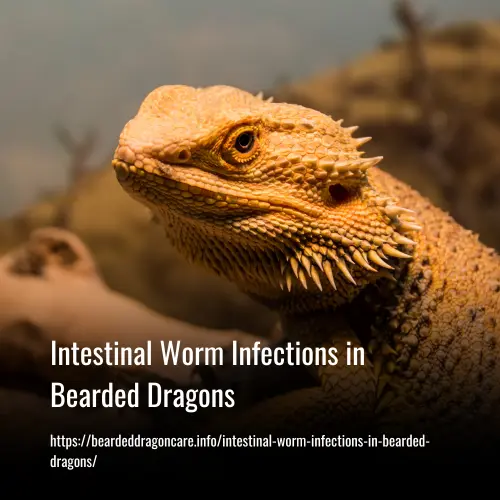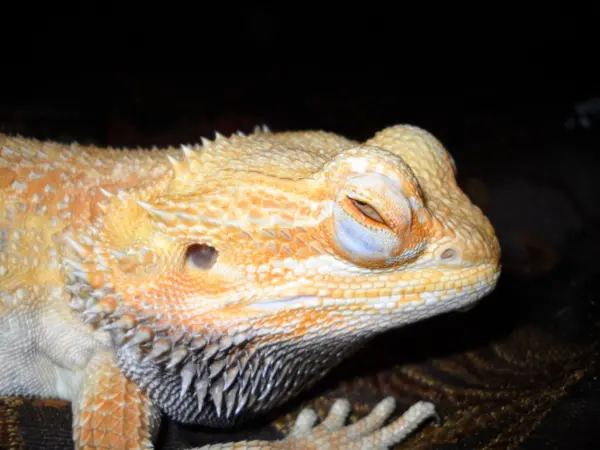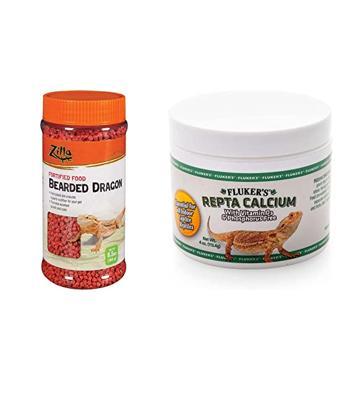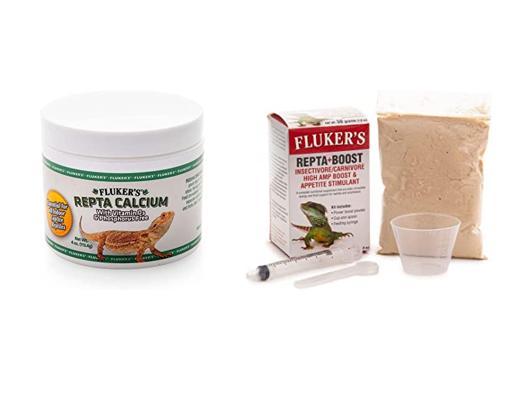Worm infections are amongst the more common parasitic diseases in pet Bearded dragons. Even though a common occurrence, worms are not always noticeable and do not always cause disease, but can still pose a health threat to Bearded dragons.
The worms referred to in this article are a group of very small worms that invade the intestines of animals (also referred to intestinal worms). They are mostly parasitic in nature and cause some form of biological damage. In order to survive, these worms need a ‘host’ on which they depend for their food, shelter, and the ability to reproduce. Each animal species has its own set of worm types that can be problematic and some worms are more dangerous than others. Problematic worm types in Bearded dragons include Pinworms (Oxyurids), Hookworms, and Roundworms.

Intestinal Worm
Intestinal worms are a common problem in bearded dragons. Pinworms and coccidia are the two most common parasites that can infect these beloved pets, but luckily they usually don’t cause any problems for healthy bearded dragons.
However, stress can weaken your beardie’s immune system and make them more susceptible to parasitic infection.
The Common Life-cycle of Intestinal Worms
Intestinal worms in Bearded dragons have a direct life-cyle. This means they are directly transmitted from one Bearded dragon to the next. When an infected Bearded dragon passes stool, worms and worm eggs are passed along with it. When another Bearded dragon comes in contact with this stool, the worms and eggs are ingested through the mouth (either indirectly, e.g. eating crawling food, or directly). This is referred to a faeco-oral mode of transmission.
After ingestion, worm eggs hatch into immature worms in various parts of the gastrointestinal tract. Immature worms parasitize on the host (giving rise to various degrees of related disease) as they grow into adults, which in turn mate and lay eggs again. Worms and eggs are then excreted in the feces to be ingested by the next Bearded dragon again.
Symptoms
Bearded dragons dealing with intestinal worm infections may experience several symptoms. One of the main signs is drastic weight loss while they are in brumation or hibernation. In addition, their feces often have a foul odor and they appear lethargic – exhibiting little enthusiasm for food or other activities.
Some may also suffer from diarrhea. It’s important to take note of these signs as soon as possible and consult with a vet to ensure your dragon gets the proper treatment.
Causes
Bearded dragons, can be infected with Intestinal worms in a number of ways. They can easily become infected with intestinal worms which are typically caused by their diet. The insects they eat, such as crickets, often carry parasites that can be passed on to lizards if not properly monitored or treated.
Juvenile Bearded Dragons are particularly vulnerable to this as they commonly feed off of crickets due to their higher protein and fat content which supports growth.
Pinworm Infections in Bearded Dragons (Oxyurids)
Pinworms are the most common type of worm found in Bearded dragons and are commonly seen in fecal evaluations. Healthy Bearded dragons, as suppose to stressed and/or sick Bearded dragons, are less prone to the effects of these worms and often goes unnoticed. This is why young, wild caught and pregnant Bearded dragons and/or Bearded dragons that live in overcrowded or unhygenic environments tend to be more affected.
Although their presence is commonly discovered on tests, Pinworms do not always cause disease. It must also be noted that many other Bearded dragon diseases (e.g. coccidiosis) can look very similar to worm infections. The treatment of Pinworms in Bearded dragons is commonly reserved for when large numbers are present, when there are concurrent health problems or when the following signs are observed:
- Partial or complete anorexia (lack of appetite)
- Weight loss & poor body condition
- Dehydration (wrinkled skin & sunken eyes)
- Weakness (lying flat)
- Lethargy or dullness (unaware of its surroundings)
More specific signs of worms in Bearded dragons include:
- Diarrhea (abnormal or runny feces and/or cloacal soiling)
- Blood tinged stool
- Vomition

Can You See Worms In Bearded Dragon Poop
It is not possible to see worms in the Poop of a Bearded Dragon; these parasites usually live in the intestines, so they cannot be seen with the naked eye. But there are certain signs that should alert owners about a potential parasitic infection. It’s important for owners to monitor their pet’s droppings for any changes in color, size, and consistency as this is often an indication that something is wrong.
If you do notice any unusual coloring or differences in the quality of their stool, take your lizard to a vet who can carry out tests such as a fecal sample examination and look for any presence of worms. The color and type of Bearded Dragons’ poop can offer great insight into their overall health; therefore it’s very important to familiarize yourself with your Beardie’s diet and what he needs to eat in order to stay healthy.
Generally speaking, brown and white stools are the most common while red, yellow, or black stools can be an indicator that something isn’t quite right. Additionally, an overweight dragon or one with too much fat may go long periods without food which shouldn’t happen frequently whilst growing juveniles need lots of protein in order to develop healthily and strongly.
Diagnosis
In order to know the type of intestinal parasites present in a pet reptile, and the proper course of treatment needed, an accurate diagnosis must be made. To do this, a veterinarian will assess the pet’s medical history, observe any clinical signs, and carry out a physical exam.
Further investigation can be done by performing an examination of a fresh fecal sample under the microscope or sending it to a laboratory for testing. This allows veterinarians to discover exactly which type of intestinal worms are present in the bearded dragon and provide them with the best possible course of treatment.
Preventing Worm Infections in Bearded Dragons
A good starting point to minimize the risk of worm infections in Bearded dragons is to buy healthy-looking, captive-bred, worm-free babies and juveniles from reputable breeders and pet shops. The risk of transferring worms between newcomers and established Bearded dragons can be significantly reduced by enforcing proper quarantine principles.
Some veterinarians and herpetoculturists believe that Bearded dragons should be dewormed routinely and regularly. It is recommended that deworming takes place at the start and the end of the quarantine period and then at least once a year for single Bearded dragons, and at least every six months for larger collections.
In order to prevent the build-up and spreading of worm eggs in the environment, good hygiene principles are very important. Droppings should be removed and food and water bowls should be cleaned and disinfected every day or as needed (i.e. directly after soiling). Complete enclosure cleaning and disinfection should also take place regularly.
Treating Worm Infections in Bearded Dragons
Bearded dragon worm treatment can either be prophylactic (as discussed earlier), symptomatic or after a diagnosis has been made. Worm infections in Bearded dragons are best diagnosed and treated by herpetologists or reptile-friendly veterinarians. In the case of a sick Bearded dragon, or where a worm infection is suspected, all those in contact should also be evaluated for potential transmission of diseases. During veterinary visits, the inclusion of a fresh stool sample will often result in a faster, and more accurate, diagnosis. Apart from the correct anti-parasitic remedy, affected Bearded dragons might also need antibiotics, parenteral fluid replacement (drips), and tube feeding.
FAQs
How Long Can A Bearded Dragon Live With Parasites?
Parasites can be deadly to a bearded dragon, potentially shortening its lifespan significantly as they cause harm to the reptile’s internal organs.
Can intestinal worms go away on their own?
Certain intestinal worms, like tapeworms, may be eliminated through an appropriate diet and a strong immune system. However, depending on the type of infestation, an antiparasitic medication may need to be administered.
What happens if intestinal worms go untreated?
Many infections have few or no symptoms, making them difficult to detect. However, they can lead to serious health problems such as seizures, blindness, heart failure, or even death.
Conclusion
In conclusion, intestinal worm infections in bearded dragons can be extremely detrimental to their health. However, if you keep a close eye on your pet’s behavior and take the necessary preventive measures, you’ll be able to protect them from any harm.
If you notice any signs of worms in your bearded dragon, consult with an experienced reptile veterinarian right away. With the right treatment plan, they can soon recover and get back to living a happy and healthy life!


